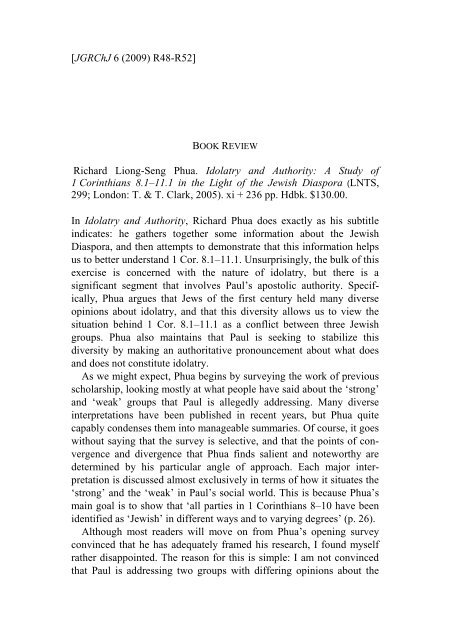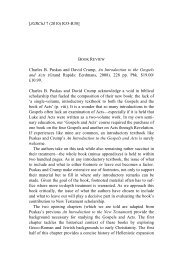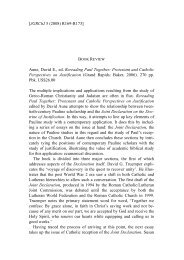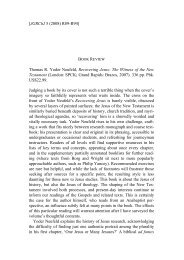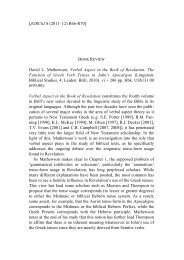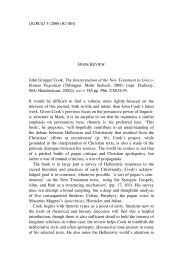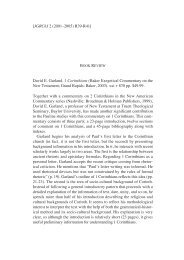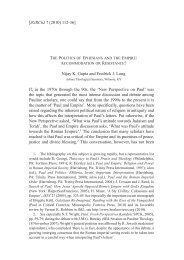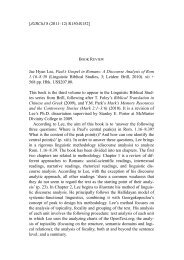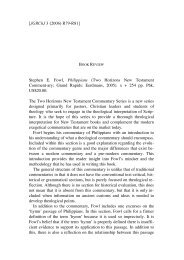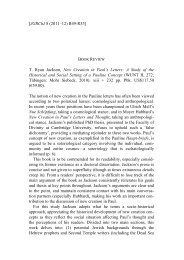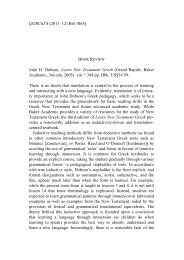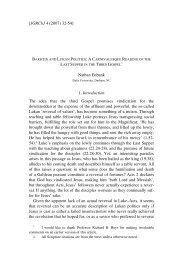Richard Liong-Seng Phua, Idolatry and Authority - Journal of Greco ...
Richard Liong-Seng Phua, Idolatry and Authority - Journal of Greco ...
Richard Liong-Seng Phua, Idolatry and Authority - Journal of Greco ...
You also want an ePaper? Increase the reach of your titles
YUMPU automatically turns print PDFs into web optimized ePapers that Google loves.
[JGRChJ 6 (2009) R48-R52]<br />
BOOK REVIEW<br />
<strong>Richard</strong> <strong>Liong</strong>-<strong>Seng</strong> <strong>Phua</strong>. <strong>Idolatry</strong> <strong>and</strong> <strong>Authority</strong>: A Study <strong>of</strong><br />
1 Corinthians 8.1–11.1 in the Light <strong>of</strong> the Jewish Diaspora (LNTS,<br />
299; London: T. & T. Clark, 2005). xi + 236 pp. Hdbk. $130.00.<br />
In <strong>Idolatry</strong> <strong>and</strong> <strong>Authority</strong>, <strong>Richard</strong> <strong>Phua</strong> does exactly as his subtitle<br />
indicates: he gathers together some information about the Jewish<br />
Diaspora, <strong>and</strong> then attempts to demonstrate that this information helps<br />
us to better underst<strong>and</strong> 1 Cor. 8.1–11.1. Unsurprisingly, the bulk <strong>of</strong> this<br />
exercise is concerned with the nature <strong>of</strong> idolatry, but there is a<br />
significant segment that involves Paul’s apostolic authority. Specifically,<br />
<strong>Phua</strong> argues that Jews <strong>of</strong> the first century held many diverse<br />
opinions about idolatry, <strong>and</strong> that this diversity allows us to view the<br />
situation behind 1 Cor. 8.1–11.1 as a conflict between three Jewish<br />
groups. <strong>Phua</strong> also maintains that Paul is seeking to stabilize this<br />
diversity by making an authoritative pronouncement about what does<br />
<strong>and</strong> does not constitute idolatry.<br />
As we might expect, <strong>Phua</strong> begins by surveying the work <strong>of</strong> previous<br />
scholarship, looking mostly at what people have said about the ‘strong’<br />
<strong>and</strong> ‘weak’ groups that Paul is allegedly addressing. Many diverse<br />
interpretations have been published in recent years, but <strong>Phua</strong> quite<br />
capably condenses them into manageable summaries. Of course, it goes<br />
without saying that the survey is selective, <strong>and</strong> that the points <strong>of</strong> convergence<br />
<strong>and</strong> divergence that <strong>Phua</strong> finds salient <strong>and</strong> noteworthy are<br />
determined by his particular angle <strong>of</strong> approach. Each major interpretation<br />
is discussed almost exclusively in terms <strong>of</strong> how it situates the<br />
‘strong’ <strong>and</strong> the ‘weak’ in Paul’s social world. This is because <strong>Phua</strong>’s<br />
main goal is to show that ‘all parties in 1 Corinthians 8–10 have been<br />
identified as ‘Jewish’ in different ways <strong>and</strong> to varying degrees’ (p. 26).<br />
Although most readers will move on from <strong>Phua</strong>’s opening survey<br />
convinced that he has adequately framed his research, I found myself<br />
rather disappointed. The reason for this is simple: I am not convinced<br />
that Paul is addressing two groups with differing opinions about the
Review: PHUA <strong>Idolatry</strong> <strong>and</strong> <strong>Authority</strong> R49<br />
eating <strong>of</strong> idol food. This is not the place to publish my own arguments,<br />
but in the spirit <strong>of</strong> critical evaluation I will make two observations.<br />
First, although <strong>Phua</strong> correctly dismisses the idea that the ‘weak’ are a<br />
purely hypothetical group <strong>of</strong> people, he does not take enough time to<br />
consider the real issue here. Are the ‘weak’ a self-declared faction with<br />
a public presence, or is Paul just talking in general terms about people<br />
who think <strong>and</strong> act a certain way? If we concede that the latter is a<br />
viable possibility, then it becomes perfectly reasonable to accept that<br />
the ‘weak’ are real people without accepting that they are a recognizable<br />
party involved in a public controversy. Second, <strong>Phua</strong> dismisses<br />
out <strong>of</strong> h<strong>and</strong> the possibility that the ‘weak’ are unbelievers. He assumes<br />
that the ‘weak’ are among Paul’s addressees, <strong>and</strong> he presumes to accept<br />
Paul’s characterization <strong>of</strong> them as evidence for beliefs they themselves<br />
hold. Readers who are in general agreement with the way that modern<br />
scholarship has framed Paul’s discussion are unlikely to stumble over<br />
<strong>Phua</strong>’s h<strong>and</strong>ling <strong>of</strong> these issues. To my mind, however, <strong>Phua</strong> proceeds<br />
with assumptions that render his eventual conclusions unpersuasive.<br />
It is in the middle chapters <strong>of</strong> <strong>Idolatry</strong> <strong>and</strong> <strong>Authority</strong> that <strong>Phua</strong><br />
provides his most substantive work, <strong>and</strong> it is the material in these<br />
sections that will likely prove to be the book’s most helpful contribution.<br />
Chapter 2 employs the work <strong>of</strong> Moshe Halbertal <strong>and</strong> Avishai<br />
Margalit in order to define idolatry in a comprehensive way. The result<br />
is a contemporary scheme that characterizes idolatry from a multifaceted<br />
perspective <strong>and</strong> refuses to accept a single, clearly-defined<br />
notion <strong>of</strong> idolatry. According to this scheme, idolatry should be<br />
described as having several ‘intellectually separable’ definitions that<br />
appear in various combinations at various times <strong>and</strong> places throughout<br />
the history <strong>of</strong> Judaism (p. 35). Interestingly, as <strong>Phua</strong> helpfully demonstrates,<br />
these intellectually separate definitions <strong>of</strong> idolatry are all<br />
present in ‘the foundational Diaspora text <strong>of</strong> the LXX’ (p. 48).<br />
As <strong>Phua</strong> rightly observes, having such a complex <strong>and</strong> subtle<br />
perspective on idolatry allows the modern scholar to evaluate (<strong>and</strong><br />
even predict) points <strong>of</strong> inter-Jewish conflict. It highlights certain<br />
behaviours that could conceivably have been deemed idolatrous by<br />
some Jews in history but not by others. Along this vein, Chapter 3 aims<br />
to prove that Jewish groups were liable to choose from among the<br />
intellectually separable definitions (p. 50). This is accomplished though<br />
a survey <strong>of</strong> Diaspora literature that is broken down into five components:<br />
Wisdom <strong>of</strong> Solomon, Philo, Josephus, Joseph <strong>and</strong> Aseneth
R50 <strong>Journal</strong> <strong>of</strong> <strong>Greco</strong>-Roman Christianity <strong>and</strong> Judaism 5<br />
<strong>and</strong> the Sybilline Oracles. After examining the relevant texts, <strong>Phua</strong><br />
concludes that ‘there appear to be some common emphases among all<br />
the Jewish authors; but there are also differences in emphasis’ (p. 88).<br />
This is subsequently treated as evidence for the conclusion that ‘there<br />
are possible loopholes that are liable to exploitation’ (p. 90). Unfortunately,<br />
<strong>Phua</strong> makes no attempt to show how a text’s silence on a<br />
certain dimension <strong>of</strong> idolatry reveals the actual beliefs <strong>of</strong> its author or<br />
its readers. Is it not equally plausible to interpret silence as silence?<br />
Perhaps this is why the word liable appears repeatedly at key points in<br />
the chapter, as in the quotation above.<br />
<strong>Phua</strong> continues in Chapter 4 with an attempt to show that ‘different<br />
Jews could behave in a manner they do not consider idolatrous but<br />
which is considered idolatrous by others’ (p. 91). Here we are treated to<br />
actual literary <strong>and</strong> archaeological evidence that some Jews in the<br />
ancient world did not recognize all <strong>of</strong> the dimensions <strong>of</strong> idolatry that<br />
<strong>Phua</strong> has isolated <strong>and</strong> identified within the LXX. <strong>Phua</strong>’s data includes<br />
the LXX translation <strong>of</strong> Exod. 22.27a, the Letter <strong>of</strong> Aristeas, the use <strong>of</strong><br />
the term Theos Hypsistos among Jews <strong>and</strong> Christians, the writings <strong>of</strong><br />
an Egyptian Jew named Artapanus, <strong>and</strong> evidence for the participation<br />
<strong>of</strong> Jews in pagan cults. Not all <strong>of</strong> this evidence is equally convincing<br />
(the discussion <strong>of</strong> Theos Hypsistos suffers from a frightful linguistic<br />
naïveté), but taken together it substantiates <strong>Phua</strong>’s main argument.<br />
Jews in the Diaspora were <strong>of</strong>ten forced to re-evaluate the meaning <strong>of</strong><br />
idolatry, <strong>and</strong> certain individuals <strong>and</strong> groups seem to have held minority<br />
views on the issue. These people sometimes engaged in social practices<br />
that most <strong>of</strong> their fellow Jews would have deemed idolatrous.<br />
Chapter 5 is the ‘so what’ section <strong>of</strong> <strong>Phua</strong>’s work. Accepting his<br />
argument that there were diverse underst<strong>and</strong>ings <strong>of</strong> idolatry among<br />
Diaspora Jews, how are we better able to underst<strong>and</strong> 1 Cor. 8.1–11.1? I<br />
confess that I am somewhat at a loss here. <strong>Phua</strong> says many things about<br />
the text <strong>of</strong> Paul’s letter that are insightful <strong>and</strong> interesting, but he never<br />
demonstrates the usefulness <strong>of</strong> drawing in the Diaspora material. At<br />
best, he shows that there are a few places in 1 Cor. 8.1–11.1 where we<br />
can draw parallels between the three parties that are allegedly debating<br />
idolatry (Paul, the ‘weak’, <strong>and</strong> the ‘strong’) <strong>and</strong> other Jewish groups in<br />
antiquity. This is interesting, but it has no impact on how we read the<br />
text unless it can also be shown that these parallels significantly shift<br />
our underst<strong>and</strong>ing <strong>of</strong> Paul’s first-century context <strong>and</strong> warrant a new<br />
reconstruction <strong>of</strong> the situation underlying his letter. This <strong>Phua</strong> has not
Review: PHUA <strong>Idolatry</strong> <strong>and</strong> <strong>Authority</strong> R51<br />
shown. Nothing the ‘strong’ believe needs to be attributed to a source<br />
other than Paul; conversely, it is unnecessary to attribute ignorance to<br />
any source at all. <strong>Phua</strong>’s work does not in any way challenge the<br />
general consensus that Paul is writing to Gentile converts who have<br />
embraced many Jewish teachings but do not yet have a view <strong>of</strong> idolatry<br />
as comprehensive as that shared by the majority <strong>of</strong> Jews <strong>and</strong> Christians.<br />
In his final chapter <strong>Phua</strong> deals with 1 Corinthians 9. This passage is<br />
in many ways the crucial testing ground <strong>of</strong> all interpretations, <strong>and</strong> I<br />
read <strong>Phua</strong>’s discussion with interest in order to discover how he would<br />
h<strong>and</strong>le its difficulties. Essentially he argues that Paul is simultaneously<br />
defending his apostleship, which has been challenged on account <strong>of</strong> his<br />
failure to accept material support, <strong>and</strong> exemplifying the humble selfsacrifice<br />
he expects from the ‘strong’. I find this approach superior to<br />
that <strong>of</strong> those who attempt to minimize one or the other <strong>of</strong> these twin<br />
purposes, <strong>and</strong> I must applaud <strong>Phua</strong> for several important observations<br />
that appear in the course <strong>of</strong> his exegesis. Unfortunately, Chapter 6<br />
concludes that ‘in 1 Corinthians 9, [Paul] seeks to show [the strong] the<br />
authority on which decisions for the Corinthian community may be<br />
based’ (p. 197). This conclusion is explicitly grounded in <strong>Phua</strong>’s conviction<br />
that Paul has cast aside the Law as a final authority in ethical<br />
matters (cf. p. 202). Here, I fear, <strong>Phua</strong> has lost sight <strong>of</strong> Paul’s true purpose<br />
in 1 Cor. 8.1–11.1. Is the entire passage not his response? What is<br />
1 Corinthians 8, if not an attempt to bring the gospel to bear on the<br />
question at h<strong>and</strong>? What is 1 Corinthians 10, if not an attempt to bring<br />
the Scriptures to bear on the question at h<strong>and</strong>? Arguably, Paul functions<br />
as an example <strong>of</strong> someone who faithfully follows the gospel <strong>and</strong><br />
the Scriptures. How then can it be said that his apostolic authority is<br />
decisive?<br />
I have already voiced a number <strong>of</strong> significant criticisms, but I must<br />
continue with two more. First, <strong>Phua</strong>’s core thesis raises a possibility<br />
that is never adequately argued. Yes, it is possible that all three parties<br />
involved in 1 Corinthians 8–10 ‘could all be Jewish’ (p. 26), but to<br />
conclude this requires a process <strong>of</strong> argumentation that evaluates the<br />
alternative possibilities <strong>and</strong> demonstrates that this one is superior. Such<br />
argumentation never appears. Perhaps this is why <strong>Phua</strong>’s thesis is set<br />
up in Chapter 1 as attempt to prove that his hypothesis is ‘plausible’ (p.<br />
26). Secondly, even if <strong>Phua</strong>’s hypothesis were to be successfully<br />
argued, it contributes nothing to our underst<strong>and</strong>ing <strong>of</strong> the Corinthian<br />
situation. This is because by ‘Jewish’ <strong>Phua</strong> means nothing more than
R52 <strong>Journal</strong> <strong>of</strong> <strong>Greco</strong>-Roman Christianity <strong>and</strong> Judaism 5<br />
‘possessing an ideology influenced by the Jewish scripture’. This is<br />
suggested already on p. 1, <strong>and</strong> it is underscored in the book’s penultimate<br />
paragraph: ‘It would be beneficial for a clear separation<br />
between Judaism <strong>and</strong> ethnicity to be made’ (p. 208). Strangely, therefore,<br />
<strong>Phua</strong>’s novel thesis that the parties ‘could all be Jewish’ coheres<br />
entirely with the vast majority <strong>of</strong> interpretations, rendering it rather<br />
uninteresting. It would be interesting if it explicitly challenged the<br />
minority view that the ‘weak’ are in fact Gentile unbelievers (the only<br />
proposed group that does not qualify as ‘Jewish’ in <strong>Phua</strong>’s sense <strong>of</strong> the<br />
term), but as I have already pointed out, this view is completely<br />
neglected.<br />
Let it not be thought that I wish to entirely dismiss <strong>Phua</strong>’s labour.<br />
There is a great deal <strong>of</strong> information contained in <strong>Idolatry</strong> <strong>and</strong> <strong>Authority</strong>,<br />
<strong>and</strong> it is only the need for brevity that has hindered me from<br />
highlighting the many insightful <strong>and</strong> well-needed observations that are<br />
scattered throughout its pages. As a concluding affirmation, let me suggest<br />
that this book will be <strong>of</strong> interest to scholars who are looking to<br />
better underst<strong>and</strong> how Diaspora Jews attempted to practice Judaism<br />
within a non-Jewish context.<br />
Christopher L<strong>and</strong><br />
McMaster Divinity College


